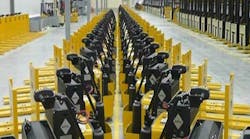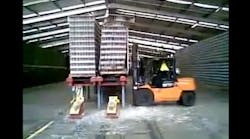This has been a long, cold, worrisome winter. The worry about this particularly mean season has made national headlines and seeped into the psyches of corporate executives. Some of the biggest stories in the last couple months concerned propane shortages in the Midwest. Pipelines serving those regions couldn’t keep up with demand for heat. This not only had shivering residents worried, but farmers too because they had trouble finding enough propane to help dry out their bumper corn crops.
Those executives are worried about the cost of energy in general. According to research by PricewaterhouseCoopers (pwc), high and volatile energy costs topped the concerns lists of both industrial manufacturing and transportation & logistics CEOs. Seventy percent of the former and 76% of the latter put this concern toward the top of their list, equating it with an increasing tax burden. There’s good reason for concern. Demand for energy is forecast to increase by as much as 50% over the next 15 years. That’s why these CEOs are eyeing developments in the U.S. shale gas infrastructure.
Speaking of infrastructure, while the transportation CEOs put the state of roads and bridges high up on their worry list, I didn’t see it place anywhere on the list of manufacturing CEOs. Maybe it’s because those logistics guys equate availability of energy with the means of delivering it. As the pwc analysts state, “Trains, planes, ships and trucks all rely on fuel—so it’s not surprising that T&L CEOs continue to worry more about high or volatile energy costs than do their colleagues across the overall sample. Since 2001 the price for crude oil has risen fourfold. Ongoing high oil prices will lead to an increased use of alternative fuels, like liquified natural gas (LNG).”
And let’s not forget propane. In fact, amidst all the news about the shortage of propane for heat this winter, I didn’t hear about any shortages of propane for powering forklifts. I asked Tucker Perkins, chief business development officer for the Propane Education and Research Council (PERC) why we haven’t been reading about any forklift fleets going dry, and he said it’s because the managers of those fleets—manage.
“Forklift customers are traditionally considered the primary plum customer for our industry,” he said. “They use about the same amount of fuel every week, 52 weeks a year. In return they have often gotten our best price and service. It’s not that class of customer you read about in the paper today. You read about these heating intensive customers in supply constrained areas, like the upper Midwest.”
His advice for those customers is to build a stronger relationship with their propane supplier. Help those suppliers understand your business and learn your supplier’s ability to meet your needs. Find out the minimum inventory level you should maintain.
Perkins said that this winter taught the entire propane industry an important lesson about the value of a baseload (year-round) customer.
“They will become even more valuable going forward,” he said. “We’re not trying to do much to make that winter peak lower. By building the baseload of clients up the peak becomes more manageable.”
The propane industry is also becoming more sensitive to the energy concerns of those transportation CEOs pwc surveyed. In fact Perkins told me his industry sees opportunities to move into the larger gasoline and diesel trucks sector as engines become more efficient and those Tier 4 and 5 diesel engines the EPA is mandating become so complex. That will become even more important for the propane industry as the makers of electric forklifts continue to eat away at propane’s share of that market.
Another company tuning into the energy sensitivity of forklift purchasing decision makers is Power Solutions International, makers of alternative-fuel and conventional power systems. PSI recently announced a multi-year supply agreement with NACCO Materials Handling Group, Inc. to supply that forklift producer with alternatively-fueled power systems. PSI earned EPA certifications for large spark-ignited engines for mobile applications running on propane and natural gas. By moving into the forklift market, this company is covering all of its bets.“I think spark ignited product will begin to compete with electrics again,” PSI’s Jeremy Lessaris told me. He’s their global director of marketing and communications. “They’ve come out with smaller turbo charged variations of engines that, having looked at the return on investment and business cases, will start to compete with electric directly. You may start to see a shift back to propane in some of the electric trucks. Then on the bigger side, because electric is expensive in those power ranges, there’s a place for it to replace tier 4 diesel because those are double the cost and twice the packaging requirement. The complexity to service a tier 4 diesel is significant vs. a spark engine that’s no different from working on your car. The serviceability will be there and the larger end will see a change from diesel to alternative fuels, whether compressed natural gas or propane.”
So for those CEOs worried about their energy costs, keep an eye on what’s happening in the forklift market. Your counterparts there are making waves that will be felt in all sectors.







